Martin Edwards's Blog, page 85
October 14, 2020
Two-Way Murder
I'm thrilled that, for the first time, the British Library is going to include in its Crime Classics series a book that has never before been published. This is Two-Way Murder by E.C.R. Lorac, an author who enjoyed success in her lifetime and is now finding a new and appreciative readership among fans of the Crime Classics who have responded very positively to books like Bats in the Belfry, Murder by Matchlight, and most recently Checkmate to Murder.
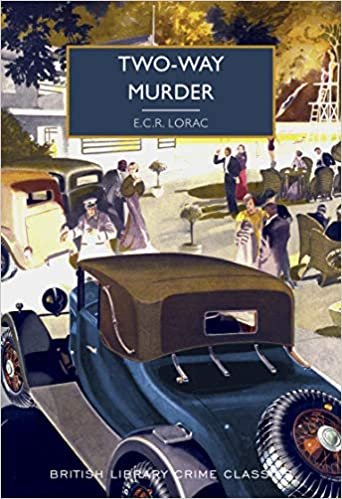
For me, this represents the culmination of a long personal journey. Those of you with excellent memories (including Fiona Birchall, who kindly pointed this out the other day) may recall that I spoke about the unpublished manuscript long, long ago. In September 2009, to be exact, I wrote a blog post referring to the leading bookseller James M. Pickard, who had obtained the manuscript. At the time I yearned for the book to be made more widely available, but I didn't know how this could best be done.
A great deal has happened during the past eleven years, and among the many wonderful developments has been the creation of the Crime Classics series. I have been urging the British Library for several years to consider publishing Two-Way Murder, and thanks to James Pickard's generosity we had the chance to study the manuscript some considerable time ago.
But progressing these projects can be complicated and sometimes it all takes much longer than you might expect to bring a plan to fruition. So it has proved with Two-Way Murder. But I'm absolutely delighted that the British Library is going ahead - this seems to me to be a splendid project for our national library to undertake, giving life to a story that never saw the light of day during its author's lifetime, or for more than sixty years since. Truly gratifying.
October 12, 2020
A Surprise for Christmas - a new British Library anthology
A Surprise for Christmas has just been published by the British Library, the latest of my anthologies for the Crime Classics series. Perhaps it's not really such a surprise that this collection has appeared. It's my fourth Christmas collection of mysteries, following Silent Nights, Crimson Snow, and The Christmas Card Crime, and all three of the previous Yuletide compilations feature near the top of my personal anthology list in terms of lifetime sales. Fingers crossed that the new book does as well.
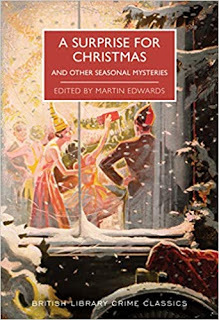
Sales aren't everything, though. They matter enormously to publishers, for obvious reasons, but for me it's always vital to try to make sure that these books are good enough to deserve some longevity. That is why I've always tried to produce anthologies that offer a distinctive personality and something more interesting than the same old, same old. For instance, I like to include some stories that will be unfamiliar to most crime fans. And I like to vary the mix, recognising that readers will have favourite stories - but personal faves vary from individual to individual.
The book takes its title from a story by Cyril Hare, a highly accomplished author of mysteries which were traditional in many ways yet generally had a distinctive and appealing tang. Hare was never a mega-seller, but he earned respect from fellow authors and readers and his work has lasted in a way that justifies his approach to his craft.
Agatha Christie, Ngaio Marsh, and John Dickson Carr also feature as contributors, so there is no shortage of big names, but there are also some much less renowned authors and stories. I should say, incidentally, that as with other BL anthologies, I've benefited from help and suggestions made by friends such as Jamie Sturgeon, Nigel Moss, and John Cooper. The result is, I hope, a book that will find its way into many a Christmas stocking.
October 8, 2020
Forgotten Book - The Fair Murder
There were just five books - the Brady bunch? - and his series detective was an engaging amateur sleuth, the sharp-witted and self-confident parson Ebenezer Buckle. Ebenezer is very much in the tradition of the Great Detective, making enigmatic remarks right, left, and centre as he solves the mystery.
I recently read The Fair Murder, known in the US as The Carnival Murder, and it's an extraordinary story. There's a very good review of it by John Norris https://prettysinister.blogspot.com/2012/08/ffb-fair-murder-nicholas-brady.html on his Pretty Sinister blog, and I agree that this book has something i common with the "weird menace pulps" in the 1930s. I've certainly not read a Golden Age book with such a distinctive flavour. But be warned - it's not for the faint-hearted, and there will be plenty of readers who find it quite unpalatable, perhaps all the more so given the traditional murder puzzle storyline.
A woman is stabbed to death at a travelling fair and the circumstances are baffling. How was the crime committed? How is it that the victim, once very attractive, became grotesque? And what was the significance of the recent attempts on her life and her changed financial circumstances? It's a pretty good puzzle, and Ebenezer and the ultra-sceptical local police inspector are engaging characters. I was drawn to the book because one element of the plot is based on an idea that had occurred to me for a story I contemplated writing. But I'd never write anything quite like Brady's novel.
October 7, 2020
Gift or Theft by Liza Cody
Liza Cody has just published a new novel, Gift or Theft, and this very welcome news prompts me to jot down a few thoughts about her writing. During the 1980s, when I was thinking about becoming a crime novelist (and I spent much of my spare time thinking of little else!), I read many different crime writers, from all sorts of periods and backgrounds. But I made a particular habit of reading the work of people of my generation or a little older, writers who were emerging at the time, to see what they were doing and how it related to the story ideas I was contemplating. I've often mentioned the likes of Peter Robinson, Ann Cleeves, and Ian Rankin, who came on to the scene at around the time I began to work on my first novel, All the Lonely People. But there were various others, including Frances Fyfield, Andrew Taylor, and Liza Cody.
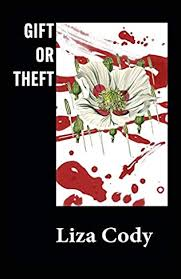
Liza Cody came to my attention as a result of the success of her very first book, Dupe, which introduced the private eye Anna Lee and won the CWA John Creasey Memorial Dagger. During my mid-twenties, I bought very few books, since money was tight, but I did invest in the paperback of Dupe, and I was much impressed. The character of Anna and the evocation of the world she lived in struck me particularly. As did the taut writing style. No wasted words with Liza Cody. Her books are always very readable.
As a result, I kept reading, and I've followed Liza's career ever since. Later, I met her in person, and found her charming and encouraging. She's also a first rate short story writer. Every now and then, when trying to put an anthology together, I've begged Liza for a contribution, and she's obliged with some wonderful stories. She also made a very valuable contribution to Howdunit, not only with a terrific essay (recommended reading!), but also with other help.
And now Gift or Theft has landed on my doorstep. Liza doesn't publish novels very frequently, so it's quite an event. The story concerns Seema, 'a gardener and a dreamer' and it looks intriguing. I'm very much looking forward to reading the latest work of a richly talented novelist.
October 5, 2020
Howdunit - early reaction
Howdunit is an unusual book, because although it contains lots of information that is valuable for people who want to write crime fiction (or detective stories, or short stories, or spy stories, or thrillers or adventure stories or radio or...you get the picture) it also seeks to entertain and engage readers who don't have literary ambitions. I don't think this has been attempted before, certainly not on such a scale, but I hoped to give readers genuine insight into the writing life. The contributors responded quite brilliantly.
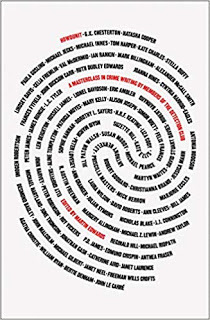
Early reaction to the book has been extremely heartening, both from writers and readers. Two interesting writers are Adam Croft and Robert Daws, who together produce a podcast called Partners in Crime. Adam is a prolific novelist whose books have sold millions of copies, while Robert has established a new career as an author of mysteries set on Gibraltar. He has another life as an actor and I remember vividly his terrific performance in the excellent TV comedy Outside Edge, in which his wife was played by Brenda Blethyn. That show, incidentally, was written by Richard Harris, who also wrote crime fiction as well as at least one excellent crime play and many TV crime series. Anyway, I digress. The latest Partners in Crime podcast included Robert's discussion of Howdunit. I was very pleased by his response to the book and encourage you to listen to the whole podcast. It's very polished, and worth subscribing to.
Kate Jackson is one of the most widely-read young bloggers around. Her Cross Examining Crime blog is required reading for Golden Age fans, and I'm delighted with her review, from the point of view of a traditional mystery fan with no particular wish to write crime fiction herself - so, quite a different perspective from that of Robert and Adam. She makes an important point about the debating issues raised by the various contributors. Anyone who reads Howdunit will realise that I made no attempt to present harmonised or sanitised opinions - on the contrary, the views of different authors vary widely, even on issues like whether or not there is such a thing as writer's block. So Howdunit doesn't present the 'official view' of the Detection Club on topics covered, because the Club doesn't have one - what it does have is a bunch of lovely members whose views I find enormously interesting and thought-provoking, whether or not I agree with them on specific points. And I'm so glad that Kate 'got' what we were trying to do. As she says: 'this book has something for everyone who is interested in crime fiction – modern or old.'
P.S. Since 'New Blogger' became compulsory. I've not figured out how to incorporate either labels or hyperlinks that work. If anyone can enlighten me, do drop me a line!
October 2, 2020
Forgotten Book - The Evil Wish
The storyline is essentially simple. Two unmarried sisters, Lucy and Marcia, live with their father, Dr Knapp, in a house in New York City large enough to accommodate a number of tenants. The doctor is a man of charm, but he's also domineering and selfish, and his daughters are little better than unpaid servants. Lucy doesn't work, and has a history of mental breakdown. Marcia has a job, and serious problem with alcohol.
Dr Knapp also has an eye for the ladies, and his latest affair is with a nurse, Pam Caldwell. Unfortunately for the daughters, he plans to marry Pam in secret, and then turf them out of the house. When they get wind of this, in their desperation they play about with ideas, mostly rather impractical, about murdering either Pam or their father. Then Fate intervenes, and Dr Knapp and Pam are killed in a car crash.
This proves to be anything but a happy ending for the bereaved daughters. Potts is interested in the idea of their moral culpability, the consequences of their "evil wish", even though they have committed no crime. Both Lucy and Marcia display increasingly self-destructive patterns of behaviour and when an unscrupulous photographer called Chuck comes into their lives, disaster beckons...
This is an exceptionally well-written book. The characterisation of the daughters is first-class and the prose sinewy. There aren't any likeable people in the story, but that doesn't really matter. I was gripped from start to finish.
September 30, 2020
The Shipman Files - BBC Two
There's been a glut of TV programmes about British serial killers in recent weeks. After Des, the Dennis Nilsen case, we've had a re-run of Appropriate Adult about Fred and Rose West, and this week there is a three-part investigation into the Harold Shipman case. This extraordinary story was the subject of an essay I published last year in a true crime anthology edited by Mitzi Szereto, and which I called 'The First of Criminals'.
The three cases are very, very different from each other, but they do have certain features in common. In particular, they reverse the usual situation with serial killers. Typically, a series of killings results in a hunt for the culprit. In each of these cases, the culprit was pinpointed, in connection with a particular crime, before the scale of their homicidal careers became apparent. In each case - and this is an absolute, enduring tragedy - the precise number and identities of the victims has never been established beyond doubt.
Chris Wilson's The Harold Shipman Files focuses, very properly, on the victims. Because Hyde is a town I know, although not well, I've been very interested in the case from day one. And I do feel quite strongly about it. Shipman's suicide robbed us of any chance of finding out his motivation, but the official report from Dame Janet Smith (which was very well done, in my opinion) explains the case with insight and empathy, and makes an attempt to fathom his mindset. The idea that he enjoyed playing God and that he became addicted to murder seems plausible to me.
He clearly had an addictive personality. I find it shocking that the General Medical Council allowed him to practise as a doctor following an early conviction for the misuse of drugs without any proper monitoring. It seems to me to reflect a long-standing tendency on the part of professional bodies (including those governing solicitors and barristers) to be too lax in dealing with people who commit misdemeanours of a kind that really indicate they aren't to be trusted. In saying this, I fully recognise the importance of giving people an opportunity of redeeming themselves - this is true of criminals and it's true of others who make bad mistakes. But if Shipman's history had been better known, if the powers-that-be had exercised more diligence after he was allowed to continue in his work, how many lives would have been saved - over two hundred? For instance, there is understandable and proper criticism of the original police inquiry, when suspicions were raised about Shipman by a fellow GP in Hyde, and which seems to have been slipshod. But if the information about Shipman's past had been more readily available, the outcome of that investigation might well have been very different.
Wilson makes the point that the age of Shipman's victims was a key factor. He killed older people, and got away with it because others accepted that older people have 'had a good innings', even if their death was sudden and wholly unexpected. The truth is that he traded on society's inherent ageism.
September 28, 2020
Mortmain Hall - the US edition
Mortmain Hall has just been published in the United States by Poisoned Pen Press and I've been delighted by the reaction so far. This includes a coveted 'starred review' in Publishers' Weekly, who say the book 'is a triumph, from its tantalizing opening, in which an unnamed dying man begins to explain an unspecified perfect crime, through its scrupulously fair final reveal'. What's more, the novel has been selected as one of Apple's best books of September, and was included in CrimeReads' list of the most anticipated books of the season and featured by Mystery Tribune as one of the best of the month.
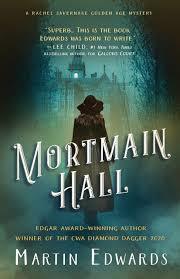
All this is gratifying, especially given that I wasn't sure how this particular novel would be received in the US, given that it's very different from so many other books which pay homage, in one way or another, to the Golden Age detective story. It's not a cosy or a pastiche and it's even quite different from its predecessor, Gallows Court. Certainly it's a story that calls for a degree of investment from the reader, since the nature of the central mystery is withheld for some time, and the characters don't actually gather at Mortmain Hall until the last third of the book. There are bound to be some readers who don't 'get' it. But that's a risk worth running. I've always liked to experiment as a crime writer, and to try fresh approaches to storytelling (in my non-fiction as well as in my fiction) and writing Mortmain Hall was a truly exhilarating experience.
Sadly, of course, there are no trips or events for me in the States to promote the book. But things are still happening. I've just taken part in a Youtube conversation with Ann Cleeves, hosted by Barbara Peters, discussing our new novels, and I'm also involved in 'virtual Bouchercon' in lieu of the real thing, which was scheduled for Sacramento. I was asked to interview Anthony Horowitz, but rather than meeting in person we've had to record our event from Europe, while I'm also due to take part in a panel about classic crime
All in all, therefore, I'm grateful for the way things have turned out, despite the pandemic. But I'm very much hoping that I'll be able to make it across the Atlantic next spring. I've missed Malice Domestic for the past couple of years and I'd love to go back there, as well as to attend next year's Bouchercon in New Orleans. Will it be possible? I don't know, but in the meantime I hope that more American readers will enjoy taking a trip to the north Yorkshire coast to find out what was really going on at Mortmain Hall.
September 25, 2020
Forgotten Book - Crime at Guildford
To celebrate Freeman Wills Crofts' publishing centenary, HarperCollins are reprinting half a dozen of his mysteries, and they include this novel, which dates from 1935. Its alternative title was The Crime at Nornes and its new title includes the name of Crofts' series detective, Inspector French. I was pleased to see the new edition, as it is one of Crofts' books that I've never got round to. And I'm equally pleased to report that it's a good one.
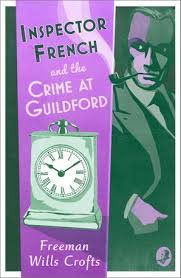
At the start of the story, we're introduced to the senior officers of a leading jewellery business, Nornes. They are in deep financial trouble, and Crofts shows his understanding of business life in the early pages. Although not exactly crackling with tension, they set the scene for what is to follow (although I thought it slightly odd that the character who is introduced in the opening lines of the book then fades completely from view). Before long, the firm's accountant is dead, and a vast haul of precious gems have been stolen from a safe. These two disasters supply the core mysteries: was the accountant killed, and if so by whom and how? And who stole the booty, and are the incidents connected?
Chief Inspector French comes on to the scene, and Crofts shifts his focus away from the misfortunes of the business, and on to the police inquiries. As usual, he charts the steps in the investigative process with such care and conviction that the rather pedestrian style of his storytelling doesn't really matter. If anything, it lends further verisimilitude to the story.
Forensic work proves to be crucial, and the technical aspects of the story are handled with Crofts' customary authority. There's a chase across the Channel at the end, but even this is treated unsensationally. Crofts wasn't a writer who set the pulse racing, but at his best - and this book is a good example of his work - he was able to keep his readers turning the page through the sheer relentlessness and dedication of French, a man intent on leaving no stone unturned in his quest for justice.
September 23, 2020
The Hour - DVD box set review

This year has, for all its other shortcomings, at least given me the chance to catch up on some film and TV viewing pleasures. Some time ago my kind daughter gave me as a present a box set of the 2011-12 TV series The Hour, which had always sounded interesting to me, but which I missed when it was first screened. At last I've been able to catch up with it.
The show was the work of an experienced screenwriter Abi Morgan, whose films include The Iron Lady and Suffragette, both of which were very watchable. The premise of The Hour is particularly interesting, and again reflects her interest in history with a political slant. The two series were set in 1956 and 1957 respectively, around a BBC current affairs show called, you guessed it, The Hour. The political events in the background - the Suez Crisis and the nuclear arms race - play an important part.
Each series comprised six episodes. The producer of the fictional programme is Bel Rowley, played by Romola Garai, with the show's anchor played by Dominic West. Ben Whishaw is a reporter called Freddie Lyon. There are also key roles for Anton Lesser and, in the second series, Peter Capaldi. With a cast like that, you can't go far wrong. In particular, I thought that Dominic West was brilliant in his portrayal of the charismatic but deeply flawed Hector Maddern. It's a tricky role that calls for an actor with a considerable range, and West definitely delivered.
The scripts are enjoyable, but they did suffer from a common weakness. The first series in particular sagged in the middle. I got the impression that Abi Morgan had enough ideas to fill three or four episodes, and that there was quite a bit of padding to spin things out. This criticism applies with less force to the second series, two episodes of which were scripted by other writers. But overall the virtues of The Hour certainly outweigh its weaknesses.
The BBC cancelled the series because of poor viewing figures, which was a pity, because I think the idea had great potential that could have been developed further, perhaps in shorter series, or with two sets of three episodes in a single series. There were also, I gather, some anachronisms, but these didn't spoil my enjoyment at all. It's worth watching for the quality of acting, but the two stories are also entertaining, especially in the closing stages.



